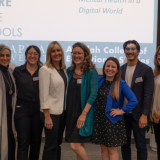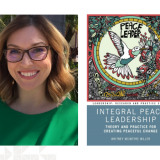Can a Comic Book Change the World?
April 7, 2015
On the eve of Wondercon at the nearby Anaheim Convention Center, the Paulo Freire Democratic Project, in conjunction with the College of Educational Studies, Graduate Studies and Leatherby Libraries, hosted “The Salon,” an evening of conversation on the topic, “Comics as Social Change.”
Doctoral student Chandra Jenkins opened the evening asking: What is a comic and how can it reflect social change? “Comics originated in a space of resistance,” she said, and “tons of women were involved back in the day, as creators.” Despite the narrative of comics being rooted in fighting crime and meting out punishment, in the McCarthy Era, comics were seen as negative and immoral. Politics have always been an influence on comics — “In the 80s, we see The Watchman as a push back against the Reagan era,” she said. “In the 90s, there were comics inspired by the AIDS epidemic.” Chandra is studying comics and videogames for her dissertation, and she’s an avid comic book reader, although she admits, she is not the stereotypical fan that many people connect with the industry. She surveyed a number of comics she likes, including the Lumberjanes about a group of alternative Girl Scouts, and Bitch Planet, which ends every issue with a feminist essay.
Tommy Kovac has been writing and illustrating since 1999. “One of the things that first drew me to comics as a reader and a creator were the representations of different kinds of people.” He added, “If you think of an idea as a virus, comics are a way to spread it super fast!” Kovac is a library technician, and he says, “Comics are a way to introduce controversial ideas into a library.”
Andrew Vo, senior bio-chemistry major here at Chapman, minoring in the Honors Program, presented next. His topic: Postmodernism and propaganda: contributions of American comic books in WWII. “During WWII, comic books were read by people of all ages, and they were a big factor in the war effort and to help boost American’s morale,” Andrew said. He linked Nietzche’s concept of the Ubermensch to Superman, and tied Foucault’s philosophy that “knowledge is in the interest and service of power – always” to several popular propaganda messages. Andrew shared some derogatory caricatures of Japanese people – that they were evil, monsters – including one drawn by the beloved Dr. Seuss. During the WWII, the US Government funded several private organizations that published and distributed wartime publications.
The last speaker of the night was David G. Brown, an NAACP Image Award Winner and political cartoon artist. “Each one of my comic books is a like a child,” he said. David got his start in advertising, and was an art director. He began working as a comic book writer and illustrator, and, after the L.A. Riots, created the comic book L.A. Phoenix, with themes of anti-graffiti and anti-violence. “I didn’t see a lot of color in comics,” he said, so his work helped change that. David’s work brought him to libraries and schools, and he discovered that young people had tremendous ideas. He applied for and got a grant and helped kids create their own comic books. He titled this series, “Tales from the Kids.” He worked with another group of young people to create “Dying to Smoke,” an anti-tobacco comic. He’s written about the Watts Towers and the West Addams Historical District. For the past several years, David has been the political cartoonist of the Los Angeles Sentinel. David shared several of his cartoons and concluded by recommending “March,” the story of Congressman John Lewis in a graphic novel.
The room was packed with students, faculty and members of the community. Stay tuned to the College of Educational Studies social media feeds for details about upcoming Salon events.
- Doctoral student Chandra Jenkins opened an evening of conversation
- PhD students and faculty member Kris DePedro (Top Right) prepare for an evening of conversation
- Tommy Kovac, writer and illustrator, joined the discussion
- Andrew Vo (Shown in photo) collaborated with Isabel Hsu on this poster presentation
- Doctoral student John Naghshineh strikes a superhero pose
- David G. Brown is an award-winning artist and the political cartoonist for the Los Angeles Sentinel







